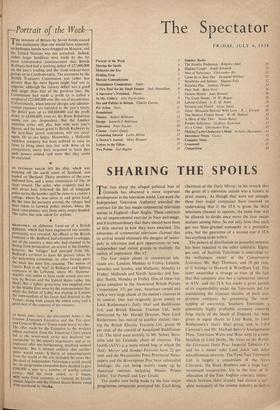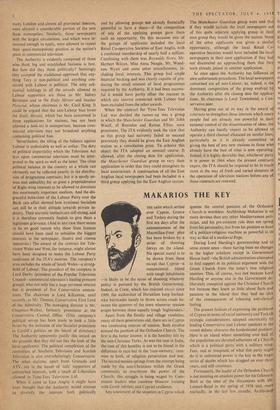SHARING THE SPOILS
THE fuss about the alleged political bias of Granada has obscured a more important development in the television world. Last week the Independent Television Authority awarded the contract for the last major commercial television station in England—East Anglia. These contracts are an unprecedented exercise in State patronage, and it is extraordinary that there should have been so little interest in how they were awarded. The advocates of commercial television claimed that its arrival would eliminate the dangers of mono- poly in television and give opportunity to new, independent and varied groups to multiply the outlets of expression. Has it?
The four major plums in commercial tele- vision are: London, Monday to Friday: London, Saturday and Sunday, and Midlands, Monday to Friday; Midlands and North, Saturday and Sun- day; North, Monday to Friday. One of these was given complete to the Associated British Picture Corporation, 371 per cent. American owned and with a very large chunk of the nation's cinemas in its control. One was originally given jointly to Lord Rothermere's Daily Mail and Rediffusion Ltd. and British Electric Traction Ltd., both dominated by Mr. Harold Drayton. Now Lord Rothermere has moved to another station, leav- ing the British Electric Traction Ltd. group 90 per cent, of the control of Associated-Rediffusion Ltd. The third went entirely to Mr. Sidney Bern- stein and his Granada chain of cinemas. The fourth .(ATV) is a more mixed bag, in which the Daily Mirror and Sunday Pictorial have 22 per cent. and the Westminster Press Provincial News- papers and the Birmingham Post have substantial holdings; the rest being mainly made up by theatrical interests including Messrs. Prince Littler, Val Parnell and Lew Grade.
The profits now being made by the four major programme companies prompted Mr. Cecil King, chairman of the Daily Mirror, to his remark that the grant of a television station was a licence to print money. As though that were not enough. these four major companies have received an undertaking that if the [TA is given the third television channel to operate, the same four will be allowed to divide once more the four major stations among them. So not only have they each got one State-granted monopoly in a particular area, but the guarantee of a second one if 1TA has anything to do with it.
The pattern of distribution to powerful interests has been repeated in the other contracts. Eighty per cent. of Scottish Television is controlled by the millionaire owner of the Conservative Scotsman, Mr. Roy Thomson, and 10 per cent. of it belongs to Howard & Wyndham Ltd. This latter ownership is strange in view of the fact that this company also has a substantial interest in ATV, arid the 1TA has made a great parade of its responsibility under the Television Act for maintaining the separate identity of each pro- gramme company by preventing the over- lapping of owner3hip, Southern Television, a potentially highly profitable company covering large tracts of the South of England, has been given in equal- shares to Lord Rank, to Lord Rothermere's Daily Mail group and to Lord Camrose's and Mr. Michael Berry's Amalgamated Press. Television 'Wales and West went to a com- bination of Lord Derby, the News of the World, the Liverpool Daily Post, Imperial Tobacco Co. and (in a minor role) Lord Astor and other miscellaneous interests. The Tyne-Tees Television Ltd. is largely a consortium of the News Ch;.onicle, the Black Brothers and a large loch investment corporation. Up to the time of th allocation of the East Anglian contract, intere.4 which between them already had almost a co., plete monopoly of the cinema industry as well many London and almost all provincial theatres, were allowed a considerable portion of the new State monopolies. Similarly, those newspapers with the largest circulations, and which were in- terested enough to apply, were allowed to repeat their quasi-monopolistic position in the nation's press in commercial television.
The Authority is evidently composed of those who think big and established business is best. But how did they think politically? Seemingly they accepted the traditional approach that any- thing Tory is non-political and anything con- nected with Labour is political. The only sub- stantial holdings in all the awards allowed to Labour supporters are those to Mr. Sidney Bernstein and to the Daily Mirror and Sunday Pictorial, whose chairman is Mr. Cecil King. It could be argued that the anti-Labour bias (even the Daily Herald, which has been concerned in three applications for stations, has not been allowed a look-in) is unimportant, because com- mercial television may not broadcast anything containing political bias.
Nevertheless, the tilting of the balance against Labour is undesirable as well as unfair. The duty of political impartiality which the Television Act lays upon commercial television must be inter- preted in the spirit as well as the letter. The close political balance in the country as a whole can obviously not be reflected exactly in the distribu- tion of programme contracts; but it is surely un- wise and unhealthy for so great a preponderance of Right-wing interests to be allowed to dominate this enormously important medium. And the dis- graceful behaviour of the Labour Party over the Bank rate affair showed how irrational Socialists can still be in their attitude towards private in- dustry. Their atavistic instincts are still strong, and it is therefore extremely foolish to give them a legitimate grievance. (And in any case there seems to be no good reason why these State licences should have been used to subsidise the biggest interests in the newspaper, theatre and cinema industries.) The award of the contract for Tele- vision Wales and West, for instance, might almost have been designed to make the Labour Party suspicious of the 1TA's motives. The company's area includes the whole of South Wales—a strong- hold of Labour. The president of the company is Lord Derby (president of the Popular Television Council—commercial television's leading pressure group), who not only has a huge personal interest but is president of five Conservative associa- tions. The chairman is Lord Kilcennin, until recently, as Mr. Thomas, Conservative First Lord of the Admiralty. The managing director is Mr. Chapman-Walker, formerly prominent at the Conservative Central Office. (This .company's political set-up has been made to look a little better by the inclusion of one Socialist prominent in Cardiff's politics on the board of directors.) The Authority apparently justify this award on the grounds that they did not like the look of the local applicants. The political comprexion of the controllers of Southern Television and Scottish Television is also overwhelmingly Conservative. The other stations, apart from Granada and ATV, are in the hands of 'safe' supporters of entrenched interests, with a touch of Liberalism allowed in Tyne-Tees Television Ltd.
When it came to East Anglia it might have been thought that the Authority would attempt to diversify the interests both politically and by allowing groups not already financially powerful to have a share—if the composition of any of the applying groups gave them such an opportunity. On this occasion one of the groups of applicants included the local Retail Co-operative Societies of East Anglia, with a combined membership of nearly half a million. Combining with them was Reynolds News, Mr. Herbert Wilcox, Miss Anna Neagle, Mr. Wood- row Wyatt and some other miscellaneous, in- cluding local, interests. This group had ample financial backing and was clearly capable of pro- ducing the small amount of local programmes required by the Authority. If it had been success- ful it would have partly offset the manner in which any interest connected with Labour had been excluded from the other awards.
When the contract for Tyne-Tees Television Ltd. was decided the runner-up was a group in which the Manchester Guardian and Mr. John Woolf, of Romulus and Remus Films, were prominent. The ITA evidently took the view that as this group had narrowly failed to succeed previously they should be given the East Anglian station as a consolation prize. To achieve this object the ITA adopted an unusual course. It allowed, after the closing date for application, the Manchester Guardian group to vary their application in order that they could strengthen its local associations. A combination of all the East Anglian local newspapers had been included in a third group applying for the East Anglian station. The Manchester Guardian group were told that I\ if they would include the local newspapers out ti of this quite separate applying group in their a own group they would be given the station. None g of the other applicants was given a similar t. opportunity, although the local Retail Co- it operative Societies would have included the local newspapers in their own application if they had not discovered on approaching them that they were already joined in another application.
So once again the Authority has followed its own unfortunate precedents. The local newspapers concerned are all non-Labour, as, indeed, is the dominant composition of the group evolved by the Authority after the closing date for applica- tions. Its chairman is Lord Townshend, a Con- servative peer.
Having gone out of its way in the award of contracts to strengthen those interests which many people feel are already too powerful in their national control of the dissemination of ideas, the Authority can hardly expect to be allowed to operate a third channel allocated on similar lines, particularly as it is already committed to giving the best of any new stations to those who already have the best of what is now operating. Indeed, it is highly desirable that, whichever party is in power in 1964 when the present contracts expire, the ITA should be required to let in much more in the way of fresh and varied elements in the operation of television stations before any of those contracts are renewed.























































 Previous page
Previous page